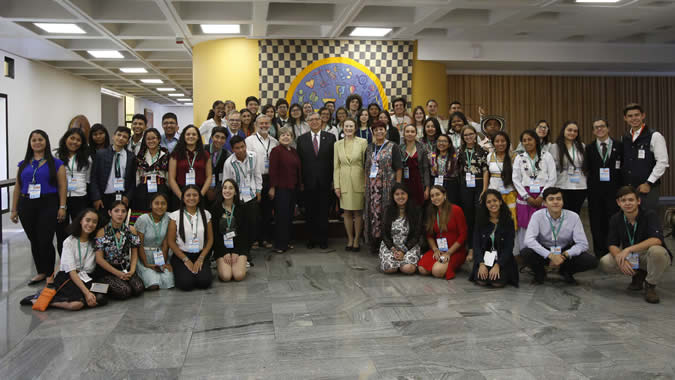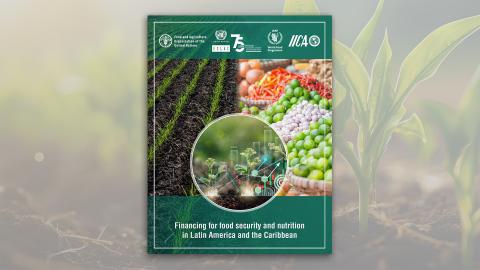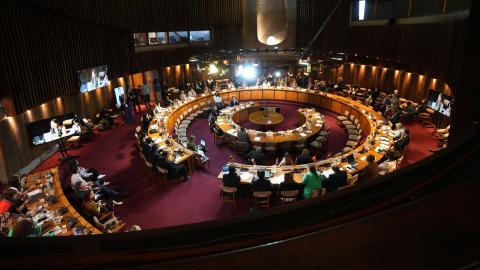News
Young people from 16 countries in the Americas urged today for breaking the cycle of poverty and inequality with a view to complying with the 2030 Agenda and its 17 Sustainable Development Goals, in a ceremony held at the headquarters of the Economic Commission for Latin America and the Caribbean (ECLAC) in Santiago, Chile.
The event was held in the framework of the Concausa (“With a Cause”) 2030 initiative, organized by América Solidaria, ECLAC and UNICEF and which seeks to identify and share widely social innovation projects that aim to achieve equality and sustainable development in the region’s countries.
The ceremony was inaugurated by Alicia Bárcena, ECLAC’s Executive Secretary; Henrietta Fore, Executive Director of the United Nations Children’s Fund (UNICEF); María Cristina Perceval, UNICEF’s Regional Director for Latin America and the Caribbean; and Benito Baranda, Chief Executive of América Solidaria International. Also present at the ceremony was the Vice President of Guatemala, Jafeth Ernesto Cabrera Franco.
In her remarks, ECLAC’s Executive Secretary sustained that “youth participation is indispensable for achieving the 2030 Agenda: sustainable development that has equality in its sights cannot be achieved without everyone’s commitment.”
“Young people are not indifferent to environmental deterioration or inequality, much less to violence and gender inequality,” she added.
Before the 51 adolescents present, Alicia Bárcena indicated that in Latin America and the Caribbean the incidence of poverty among the population from 0 to 14 years of age, as measured in monetary terms, has declined significantly in the last 15 years, falling from 60% to 47% between 2002 and 2016. However, she added, the incidence of extreme poverty in this age group has remained relatively stable (18% in 2002 and 17% in 2016).
“Poverty is more intense among boys, girls and adolescents. This situation is even more serious among Afro-descendant and indigenous boys and girls and those who reside in rural areas,” she noted.
The senior United Nations official called for highlighting the positive contributions made by young people, in order to fight the stigmatization that youth experience in the region, which contributes to their marginalization, exclusion and the infringement of their rights.
“You are the first generation to have been born with full awareness that it is crucial to take care of our planet’s future and that economic, social and environmental problems are interrelated. You are also the first generation of “digital natives.” You are, therefore, leading and catalyzing actors in this process of technological revolution,” she stated.
“We feel honored that today you can present your wishes and dreams as materialized in concrete projects that aim to build a more just society, in which no one is left behind,” Alicia Bárcena said.
Henrietta Fore, meanwhile, called on young people to “take over the world” and communicate their dreams.
“We are here to hear about your hopes and dreams. Please, tell us what you need. You are all entrepreneurs,” she stated.
María Cristian Perceval called for working to ensure that education is a right and not a privilege, and she urged the young people to rebel against inequality “so that not one boy, nor one girl, is left behind.”
Benito Baranda, in his remarks, called on the adolescents to move from indignation to commitment and to work for more egalitarian treatment.
“The worst inequality is that of treatment, color, language, stature. You can change that inequality. With egalitarian treatment it is very easy to access justice. You can build a more egalitarian region,” he said.
In this third version of Concausa, 696 projects led by more than 2,000 young people between 15 and 17 years of age were submitted for consideration – a figure that doubled the applications received in the prior round, held in 2017.
From all these submissions, the Concausa jury selected 17 projects designed and implemented by young people from Argentina, Bolivia, Chile, Colombia, Costa Rica, Ecuador, El Salvador, Guatemala, Honduras, Mexico, Nicaragua, Paraguay, Peru, the United States, Uruguay and Venezuela.
The selected teams traveled to Santiago, Chile to participate in a week of educational activities that will familiarize them with the scope of the 2030 Agenda and its 17 Sustainable Development Goals.



